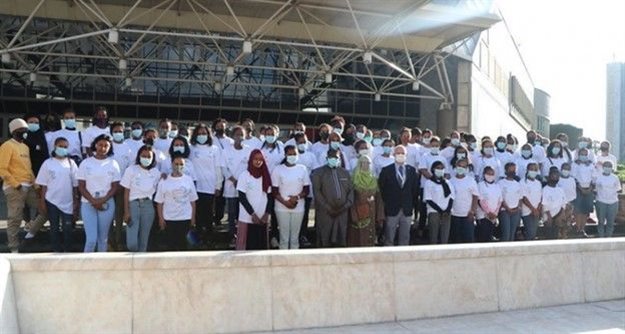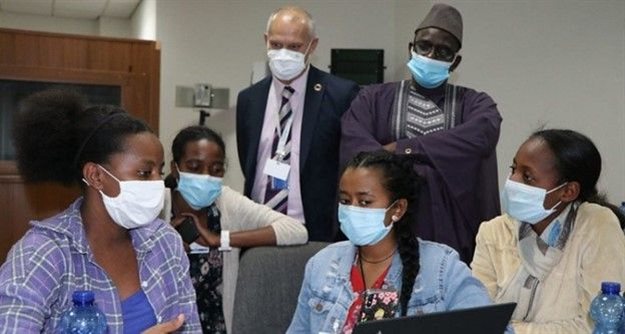
Top stories




The girls, drawn from various socio-economic backgrounds, learned about computer programming, the internet of things, Turtle Stitch, AI, web development and a fine dose of human rights and entrepreneurship, among other subjects. Most of the training took place virtually.
The trainers, from different countries in Africa, challenged the girls to develop apps to address problems they have either experienced or observed during the Covid-19 pandemic. The results were phenomenal, not just at the technical level, but also on the girls’ team work and collaboration skills, entrepreneurial foundations, and confidence building in oral and written communication.
As a former school principal-turned-academic, my entire career has interacted with the field of education and its discontents. But at no time has the complexity of equitable access to school been more urgent than during this Covid-19 pandemic.
For decades prior to Covid-19, educators and policymakers in Africa grappled with the gamut of issues and choices around building schools – new schools; equity; increasing access for girls, the marginalised, the vulnerable and in general, and those in need, and experiments with laptops in schools.
Then even where access is possible, there is the question of quality of the education, the relevance of the curriculum and ensuring that skills and knowledge taught in schools align with the skills needed in the labour market. In this terrain, some have made the unfortunate argument that STEM subjects are more important than the humanities - even disparaging the importance of sports, arts and creativity.

For the girl-child in most African countries, access to education was never always guaranteed. But through frameworks such as the Beijing Platform for Action, modest strides have been made. Yet, there is a lot of talk these days that is not prefaced with not being on track to meet the 2030 Sustainable Development Goals (SDGs).
In the plethora of priorities, African countries will probably continue to struggle to “ensure inclusive and equitable quality education and promote lifelong learning opportunities for all” by 2030 (SDG 4) for a long time to come – for both girls and boys and it’s not hard to see why.
With Covid-19 wreaking havoc across the globe, Unesco’s estimates of learning loss suggest that 25% more students may fall below a baseline level of proficiency needed to participate effectively and productively in society, and in future learning opportunities.
Globally, 23.8 million children, adolescents and youth from pre-primary to tertiary level may be going into the new year with nothing to celebrate. They may drop out or not have access to school due to the pandemic’s economic impact alone, including 11.2 million girls and young women.
Unesco’s report is even more bleak and projects that up to 20 million girls and young women in low- and low-middle income countries will not go back to school globally.
In Africa, the situation is even more dire as, reported in the Unesco <>iCovid-19 Education Response 2020 report, a higher percentage of girls across all education levels is likely to be affected (1.99%), compared to boys (1.90%). In addition, pre-primary education will be hit the hardest, with enrolment expected to decline by 7.9% for both boys and girls. Students living in poverty and marginalisation and those affected by conflict and migration are hit the hardest. This should make any policymaker nervous. Indeed, it’s a frightening reality for those struggling with the economic fallout of the Covid-19 pandemic, and those being forced to make choices that diminish their children’s future.
And here is where the coding camp story is heartening. The initiative is an example of what institutions can do to increase access to learning when schools are inaccessible. Coding is empowering. It offers a glimmer of hope and opens up possibilities to young girls to confront untold challenges, including taking on household burdens, depression, mental health issues and abuse under Covid-19 conditions.
Providing quality and equitable education to all is challenging at the best of times. Building back better post the hard times will require massive innovation to achieve a pipeline of diverse opportunities, including in sustainable science, technology, engineering and mathematics, to drive Africa’s industrialisation. The coding camp gives us a glimpse of what is possible when efforts are made to create opportunities for girls and young women.
My first wish is to see more institutions joining hands and partnering with local schools and communities across Africa to create small-scale bootcamps for disadvantaged students. Telecom companies can offer free bandwidth to make coding a reality and support innovative learning methods to keep students from dropping out and experiencing learning loss.
My second wish is to see a movement where individuals bring hope to students that are being forced out of school. From contributing to school fees to mentoring and playing a role as models, we can all as individuals, in our own communities, keep our youth and children engaged in learning and in formal education. Added to progressive government policies, a movement that takes local action should chip away at the Unesco data one percentage at a time.
Article originally published on Africa Renewal.